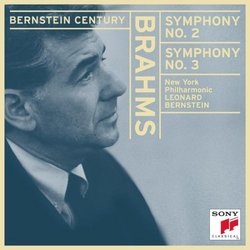| All Artists: Brahms, Bernstein, Nyp Title: Brahms: Symphony 2 / Symphony 3 / Bernstein Members Wishing: 0 Total Copies: 0 Label: Sony Release Date: 7/27/1999 Genre: Classical Style: Symphonies Number of Discs: 1 SwapaCD Credits: 1 UPC: 074646182925 |
Search - Brahms, Bernstein, Nyp :: Brahms: Symphony 2 / Symphony 3 / Bernstein
 | Brahms, Bernstein, Nyp Brahms: Symphony 2 / Symphony 3 / Bernstein Genre: Classical
|
Larger Image |
CD Details |
CD ReviewsStunning Brahms 3rd Michael Bernstein | Coulterville, California United States | 04/10/2006 (5 out of 5 stars) "I have just recently listened to a number of recordings of the Brahms' 3rd, including the justly renowned recordings by Bruno Walter and Otto Klemperer. Bernstein's performance is quite simply the best I have heard. The first movement, for example, has an intensely propulsive energy and drama, without sacrificing any of the work's lovely lyricism. The other three movements live up to the first movement's remarkable standard. Also, I must respectfully disagree with those who are disappointed by the sound: it has a wide, open sound stage, and captures details beuatifully, such as the bass line and woodwinds. This recording should be in the collection of anyone loving this work." Great job, Lenny Larry VanDeSande | Mason, Michigan United States | 04/07/2004 (5 out of 5 stars) "I'd agree with just about every work in John Kwok's review of this CD and might go him one or two better. I am not much of a fan of "Lenny" and have never lived or died with the overindulgence of his Beethoven and Mahler. But I heard this version of Symphony 2 on my local PBS station one afternoon and could hardly believe the announcer when he declared it was the Bernstein-New York Philharmoic version. For one thing, the New York strings, which rarely recorded well in the 1960s, sound golden in this 1962 recording from Avery Fisher Hall. And nervous Lenny lets the sunny first movement of the 2nd Symphony unfold as if he were Bernard Haitink! He's the same old Bernstein in the Allegro con spirto finale, with the emphasis on spirito. I never cared much for the Brahms 3rd Symphony, to be honest. Even Stokowski's "Stoki"izing of it on Everest rarely moved me. But this record, with its combination of repose, poetry and driving rhythm, showed me something in this music I hadn't heard before. Along with his Vienna recordings of the Schumann symphonies, this is my favorite Leonard Bernstein record." Bernstein finds both joy and strength in these two symphonie Santa Fe Listener | Santa Fe, NM USA | 02/20/2007 (5 out of 5 stars) "Having heard these readings of the Brahms 2nd and 3rd on LP, I came back to them recently, only to disscover that my memory of them was quite wrong. These aren't, as I recalled, soft or indulgent performances but grand, sometimes muscular ones, unexpectedly so in the case of the Second, whose first movement is amazingly passionate. At the time of their release in 1962, the most famous Brahms recordings were being made by Bruno Walter, and the Second and Third Sym. were the highlight of his cycle, played with geniality, serenity, and wisdom.
Bernstein counters with the opposite approach, giving us music full of drama and inner turmoil. Tempos tend to be slowish, but the energy level remains intense. LB took a psychological slant on Brahms, and for him the romanatic joy that caps these two symphonies is the payoff after romantic struggle, even agony. The NY Phil. plays with committed intensity, and the soundstage is huge. The hard rawness I remember in the sound has been fairly well smoothed out by remastering, except in the loudest passages. The miking is close-up enough that we get to enjoy the wonderful solo woodwinds, especially in the Second. For anyone who's skeptical, sample the lilting Scherzo, which LB phrases with real spontaneity. The opening of the Third bursts out with a sense of swelling joy that's remarkable. Another note to skeptics: LB doesn't use excessive rubato and all the tempos are completely normal. In later years he would take a much more personal view of Brahms, but in this early period, one can only call him exemplay. These two readings offer more sheer pleasure than Karajan, Szell, and Klemperer, yet are almost completely overlooked." |

 Track Listings (8) - Disc #1
Track Listings (8) - Disc #1